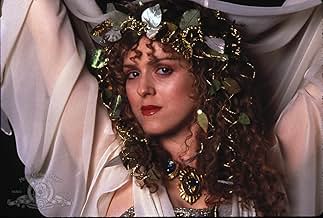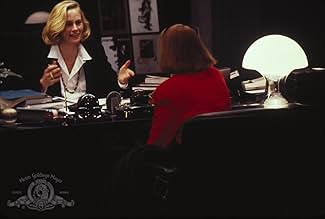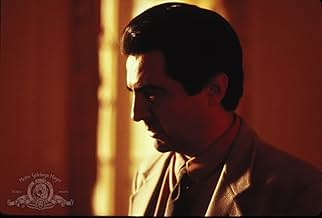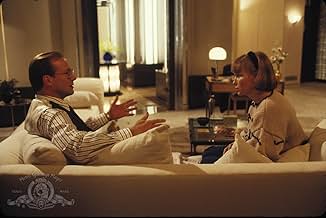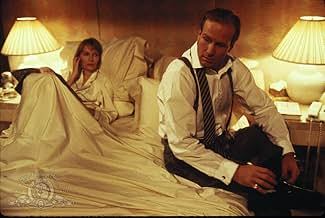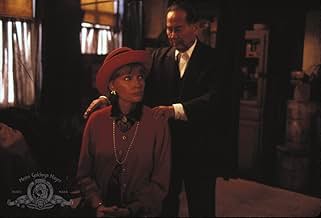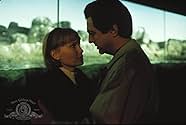VALUTAZIONE IMDb
6,6/10
15.894
LA TUA VALUTAZIONE
Una casalinga borghese e viziata di Manhattan riconsidera la sua vita dopo aver visitato un guaritore di Chinatown.Una casalinga borghese e viziata di Manhattan riconsidera la sua vita dopo aver visitato un guaritore di Chinatown.Una casalinga borghese e viziata di Manhattan riconsidera la sua vita dopo aver visitato un guaritore di Chinatown.
- Regia
- Sceneggiatura
- Star
- Candidato a 1 Oscar
- 1 vittoria e 7 candidature totali
Matthew H. Williamson
- Dennis
- (as Matt Williamson)
Recensioni in evidenza
Mia Farrow excels in this unexpectedly charming fable. I think if people happened upon this movie not knowing it was a Woody Allen film, they would be more than pleased with it. Knowing it is Woody, maybe many fans hold it to a higher standard. True, it's not anywhere near being his funniest or greatest film. But I think it is a well-cast, well-shot, well-produced, and even well-written tale. Knowing it's history, I was not expecting to like it nearly as much as I did. But I did, and I look forward to seeing it again. Mia really is underrated as an actress, isn't she?
Next to the Front, this contains Woody Allen's best ending. There's one striking visual image in the plot I still can't get out my head: Mia is cheating on William Hurt with Joseph Mantegna and the 2 of them are over at Mantegna's apartment, while a glorious downpour crashes against a huge glass window behind them. The sound of the rain hitting the window compliments their nervous dialogue perfectly. One of Farrow's nicest performances (the Purple Rose of Cairo is her most heartbreaking). And where else are you going to see invisibility in the same story as Mother Theresa? One of Allen's better cast jobs, too. Even the smallest roles are exquisite. Gwen Vernon as Farrow's old time movie star mother is sublime. And Bernadette Peters makes a great wise cracking muse.
I think Woody Allen's 'Alice' is one of his most under-rated creations. This movie comes from his glory days before the scandal with his adopted daughter eclipsed his U.S. career.
Here is vintage Woody. A fecund imagination married to a masterful story-telling talent.
Like 'The Purple Rose of Cairo' (his masterpiece in my estimation) this is pure fantasy and it is delightful. Mia Farrow has done nothing finer, equal to her portrayal in Polanski's 'Rosemary's Baby' though of a completely different genre.
The little socio-political messages do not interfere with what is otherwise a nifty little love story between Alice and Joe Mantagna. Things don't quite work out in the end, as is usual in a Woody movie, but they are on the border of real-life possibility and add the bittersweet note that he is so good at.
I love this movie. It is not one of his rocking comedies like 'Broadway Danny Rose' but is a sweet vignette. It has overtones of 'Diary of Mad Housewife' but with a happier ending, for the housewife anyway.
The scenes with Keye Luke, Alice's magical Eastern physician are subtle and funny. The fantasy scenes with Alec Baldwin's dead lover and the wonderful Bernadette Peters' muse are enchanting. Peters' Bronx-like muse is especially funny.
Don't miss it.
Here is vintage Woody. A fecund imagination married to a masterful story-telling talent.
Like 'The Purple Rose of Cairo' (his masterpiece in my estimation) this is pure fantasy and it is delightful. Mia Farrow has done nothing finer, equal to her portrayal in Polanski's 'Rosemary's Baby' though of a completely different genre.
The little socio-political messages do not interfere with what is otherwise a nifty little love story between Alice and Joe Mantagna. Things don't quite work out in the end, as is usual in a Woody movie, but they are on the border of real-life possibility and add the bittersweet note that he is so good at.
I love this movie. It is not one of his rocking comedies like 'Broadway Danny Rose' but is a sweet vignette. It has overtones of 'Diary of Mad Housewife' but with a happier ending, for the housewife anyway.
The scenes with Keye Luke, Alice's magical Eastern physician are subtle and funny. The fantasy scenes with Alec Baldwin's dead lover and the wonderful Bernadette Peters' muse are enchanting. Peters' Bronx-like muse is especially funny.
Don't miss it.
Mia Farrow is "Alice" in this 1990 Woody Allen film. Here, Allen borrows from "Juliet of the Spirits" and "Alice in Wonderland" to make a delightful movie about an unhappy woman trying to find herself.
Alice (Farrow) married a wealthy man (William Hurt) and gave up a career in fashion. She has everything - a gorgeous New York apartment, two children, and servants. She spends her time shopping and having beauty treatments. At her kids' school, she meets a man (Joe Mantegna) and is shocked to realize that she's attracted to him. When she goes to a Dr. Yang (Keye Luke) for a back problem, Dr. Yang sees right away that Alice's pain is psychological. He gives her an herb to take.
The herb has an amazing effect on Alice, who then openly flirts with the object of her affection, Joe. Dr. Yang keeps hitting Alice up with potions: one makes her invisible, so she can watch Joe with his psychiatrist ex-wife (Judy Davis); another reunites her with the ghost of her first love (Alec Baldwin). Alice and Joe finally get together. But one of the potions helps her to find something out that she not only didn't know, but that changes her life.
Mia Farrow does a good job as Alice; in my opinion, other than "Rosemary's Baby," she did her best work with Allen. The rest of the cast is good and sail through this film about self-discovery, unrealized goals, and passion. An unsung film of Allen's that deserves more attention.
Alice (Farrow) married a wealthy man (William Hurt) and gave up a career in fashion. She has everything - a gorgeous New York apartment, two children, and servants. She spends her time shopping and having beauty treatments. At her kids' school, she meets a man (Joe Mantegna) and is shocked to realize that she's attracted to him. When she goes to a Dr. Yang (Keye Luke) for a back problem, Dr. Yang sees right away that Alice's pain is psychological. He gives her an herb to take.
The herb has an amazing effect on Alice, who then openly flirts with the object of her affection, Joe. Dr. Yang keeps hitting Alice up with potions: one makes her invisible, so she can watch Joe with his psychiatrist ex-wife (Judy Davis); another reunites her with the ghost of her first love (Alec Baldwin). Alice and Joe finally get together. But one of the potions helps her to find something out that she not only didn't know, but that changes her life.
Mia Farrow does a good job as Alice; in my opinion, other than "Rosemary's Baby," she did her best work with Allen. The rest of the cast is good and sail through this film about self-discovery, unrealized goals, and passion. An unsung film of Allen's that deserves more attention.
Or "Alice Doesn't Live Here Anymore" (Scorsese fans will get the reference), there seems to be some inner-girl escape-impulse associated to the name Alice and Woody Allen's heroine, played by the irresistible Mia Farrow, is no exception.
Alice is married to Doug, a wealthy businessman played by William Hurt. Together, they live in a luxurious apartment of Manhattan, her kids go to a private Catholic school, she's got a baby sitter, a cook, a trainer, a decorator, and all the time in the world to go shopping, get beauty treatments, gossip with her friends... and worry.
Some deep torment expresses itself through backaches and a sort of Catholic guilt due to her infatuation on Joe Ruffalo, a dark and handsome Jazz musician played by Joe Mantegna. Something is burning inside, channeling itself through that innocent lust, behind the obvious, there might be some strong existential call. Following numerous advice, Alice visits Dr. Yang (Keye Luke) a herbalist who seems to know what it's all about, certainly not the back.
The film deals with serious matters such as existential boredom, meaning of life, infidelity, but the "Chinese Riff" and tango leitmotifs remind us that this is all played for laughs, so we're not surprised when the treatment ventures in the realm of fantasy. Comedy needs that extra-kick when the laughs are too mild-mannered. For instance, when Alice mentions that penguin mate for life, Yang's answers "you think they're Catholic?" echo the infamous 'pigeon' quote from "Hannah and her Sisters" and it's not a good sign when Allen recycles his own jokes.
Only halfway through the film when the adoration of Mother Teresa and a few references about childhood reemerged that I understood that Catholicism wouldn't be the butt-monkey of Allen's humor but something with a strong bearing on Alice's guilt and existential crisis. Something that can be summed up in that quote from "Inherit the Wind": "What touches you, what warms you? Every man has a dream. What do you dream about? What... what do you need?"
The answer is surely not in Alice's life, Doug constantly belittles her ambitions, a TV series executives played by Cybil Shepherd dismisses her writing projects, and everyone treats her with relative condescendence. It's hard to believe that the film was released 22 years after "Rosemary's Baby". Here is Mia Farrow as a middle-aged mother caught in the suffocating coziness of an apartment supported by seemingly benevolent people and looking as frail, powerless and "young" as her Rosemary counterpart.
I guess fragility has always been Mia's strongest suit, one she wears with grace and gentleness, the only negative feeling she's capable to embody is that Catholic guilt less as a principle than an alibi to her incapability to fight, except her own demons. That's Alice Tate in a nutshell, and one can draw parallels with Cecilia from "The Purple Rose of Cairo", a woman who could only find artifices to escape her condition (and coincidentally, the film became my highly rater movie for helpfulness).
So there's one thing that Woody Allen's "Alice" gets right is the casting, Diane Keaton is too strong and free-spirited to fit the character. It's obvious Allen wrote it for and with Mia in mind, a few years before their marriage would collapse, foreshadowing of many scandals and accusations. I'd rather ignore the storm and contemplate the silence; this is one of Mia Farrow's best roles and it was written by someone who obviously knew her a lot and loved her enough to provide her a character with a happy ending, not bittersweet but happy. Mia was overdue one.
There's a catch though, she's so sweet and genuinely sympathetic that she' not really the best choice for a leading comedic role, it's not a case of "women can't be funny" but there's a moment where after drinking of a mixture, she learns how to talk with a seductive voice and talks sexy with Joe , who responds nervously. That scene was funny but it was incongruous and I was afraid it would be a "reveal your inner self" moment. I needed to relate to the real Alice, which happens to be in line with Mia's personality.
So the film is a series of situation where a fantasy device allows Alice to know about her husband's whereabouts, to talk with her deceased ex-boyfriend, a sexy bad boy played by Alec Baldwin, to have a hilarious talk with her muse played by Bernadette Peters, to talk with her mother... it's basically a psychoanalysis through magical plants with many visual gags, some genuinely good moments, especially the visit to her sister played by Blythe Danner, but we're never taken to the heights reached by "Hannah and Her Sisters" or "The Purple Rose of Cairo" except for a hilarious sequence involving a love potion.
Despite a few moments of creativity, the film is Woody Allen at his mildest, driving us at cruise speed to a satisfying ending where Alice finally fulfills her dreams because she knew how to control herself and get rid from her entourage's nuisance, embodying that quote from a French great man named Clemenceau: "in life, you've got to know what you want to do, have the courage to say it and the energy to do it."
Still, had they made a "Real Housewives of Manhattan" in 1990, I wonder if a character like Alice Tate would have been kept in regard to audiences' premises. She'd be just too gentle, too shy, too introverted to contribute to the narrative dynamics... and yet she is the titular heroine of a film with a high promise, the result is uneven, it's heart-warming but slow-paced though not deprived of interesting dynamics.
Maybe there's a reason why it's rarely mentioned among Allen's best... but never among his worst. Some would call it a gem, I would call it an enjoyable little film. Which is good enough.
Alice is married to Doug, a wealthy businessman played by William Hurt. Together, they live in a luxurious apartment of Manhattan, her kids go to a private Catholic school, she's got a baby sitter, a cook, a trainer, a decorator, and all the time in the world to go shopping, get beauty treatments, gossip with her friends... and worry.
Some deep torment expresses itself through backaches and a sort of Catholic guilt due to her infatuation on Joe Ruffalo, a dark and handsome Jazz musician played by Joe Mantegna. Something is burning inside, channeling itself through that innocent lust, behind the obvious, there might be some strong existential call. Following numerous advice, Alice visits Dr. Yang (Keye Luke) a herbalist who seems to know what it's all about, certainly not the back.
The film deals with serious matters such as existential boredom, meaning of life, infidelity, but the "Chinese Riff" and tango leitmotifs remind us that this is all played for laughs, so we're not surprised when the treatment ventures in the realm of fantasy. Comedy needs that extra-kick when the laughs are too mild-mannered. For instance, when Alice mentions that penguin mate for life, Yang's answers "you think they're Catholic?" echo the infamous 'pigeon' quote from "Hannah and her Sisters" and it's not a good sign when Allen recycles his own jokes.
Only halfway through the film when the adoration of Mother Teresa and a few references about childhood reemerged that I understood that Catholicism wouldn't be the butt-monkey of Allen's humor but something with a strong bearing on Alice's guilt and existential crisis. Something that can be summed up in that quote from "Inherit the Wind": "What touches you, what warms you? Every man has a dream. What do you dream about? What... what do you need?"
The answer is surely not in Alice's life, Doug constantly belittles her ambitions, a TV series executives played by Cybil Shepherd dismisses her writing projects, and everyone treats her with relative condescendence. It's hard to believe that the film was released 22 years after "Rosemary's Baby". Here is Mia Farrow as a middle-aged mother caught in the suffocating coziness of an apartment supported by seemingly benevolent people and looking as frail, powerless and "young" as her Rosemary counterpart.
I guess fragility has always been Mia's strongest suit, one she wears with grace and gentleness, the only negative feeling she's capable to embody is that Catholic guilt less as a principle than an alibi to her incapability to fight, except her own demons. That's Alice Tate in a nutshell, and one can draw parallels with Cecilia from "The Purple Rose of Cairo", a woman who could only find artifices to escape her condition (and coincidentally, the film became my highly rater movie for helpfulness).
So there's one thing that Woody Allen's "Alice" gets right is the casting, Diane Keaton is too strong and free-spirited to fit the character. It's obvious Allen wrote it for and with Mia in mind, a few years before their marriage would collapse, foreshadowing of many scandals and accusations. I'd rather ignore the storm and contemplate the silence; this is one of Mia Farrow's best roles and it was written by someone who obviously knew her a lot and loved her enough to provide her a character with a happy ending, not bittersweet but happy. Mia was overdue one.
There's a catch though, she's so sweet and genuinely sympathetic that she' not really the best choice for a leading comedic role, it's not a case of "women can't be funny" but there's a moment where after drinking of a mixture, she learns how to talk with a seductive voice and talks sexy with Joe , who responds nervously. That scene was funny but it was incongruous and I was afraid it would be a "reveal your inner self" moment. I needed to relate to the real Alice, which happens to be in line with Mia's personality.
So the film is a series of situation where a fantasy device allows Alice to know about her husband's whereabouts, to talk with her deceased ex-boyfriend, a sexy bad boy played by Alec Baldwin, to have a hilarious talk with her muse played by Bernadette Peters, to talk with her mother... it's basically a psychoanalysis through magical plants with many visual gags, some genuinely good moments, especially the visit to her sister played by Blythe Danner, but we're never taken to the heights reached by "Hannah and Her Sisters" or "The Purple Rose of Cairo" except for a hilarious sequence involving a love potion.
Despite a few moments of creativity, the film is Woody Allen at his mildest, driving us at cruise speed to a satisfying ending where Alice finally fulfills her dreams because she knew how to control herself and get rid from her entourage's nuisance, embodying that quote from a French great man named Clemenceau: "in life, you've got to know what you want to do, have the courage to say it and the energy to do it."
Still, had they made a "Real Housewives of Manhattan" in 1990, I wonder if a character like Alice Tate would have been kept in regard to audiences' premises. She'd be just too gentle, too shy, too introverted to contribute to the narrative dynamics... and yet she is the titular heroine of a film with a high promise, the result is uneven, it's heart-warming but slow-paced though not deprived of interesting dynamics.
Maybe there's a reason why it's rarely mentioned among Allen's best... but never among his worst. Some would call it a gem, I would call it an enjoyable little film. Which is good enough.
Lo sapevi?
- QuizSean Young filmed a small role, but it was later cut. She had been deleted from Woody Allen's previous film Crimini e misfatti (1989) as well.
- BlooperWhen Thelonious Monk's version of "Darn That Dream" appears on the soundtrack, the LP sleeve of "Monk's Dream" is shown, implying that Alice and Joe are listening to it. However, the tune is not featured on that album.
However, implications are not necessarily fact; it might be that Alice and Joe had been listening to several Monk albums and had not been meticulous in returning the discs to the appropriate sleeves.
- Colonne sonoreLimehouse Blues
Written by Philip Braham & Douglas Furber
Performed by Jackie Gleason
Courtesy of Capitol Records, Inc.
By arrangement with CEMA Special Markets
I più visti
Accedi per valutare e creare un elenco di titoli salvati per ottenere consigli personalizzati
Dettagli
Botteghino
- Budget
- 12.000.000 USD (previsto)
- Lordo Stati Uniti e Canada
- 7.331.647 USD
- Fine settimana di apertura Stati Uniti e Canada
- 36.274 USD
- 25 dic 1990
- Lordo in tutto il mondo
- 7.331.647 USD
- Tempo di esecuzione1 ora 46 minuti
- Colore
- Proporzioni
- 1.85 : 1
Contribuisci a questa pagina
Suggerisci una modifica o aggiungi i contenuti mancanti



